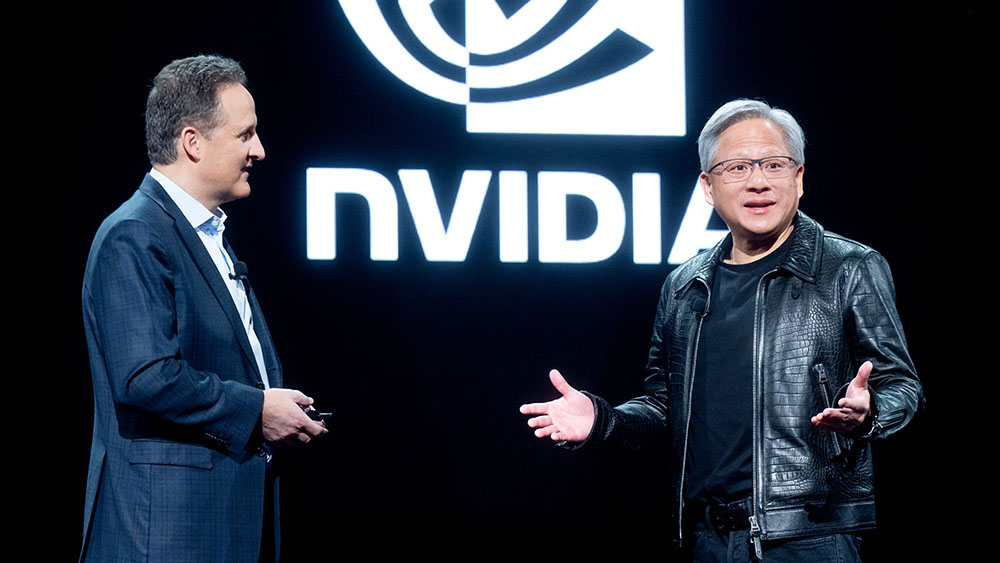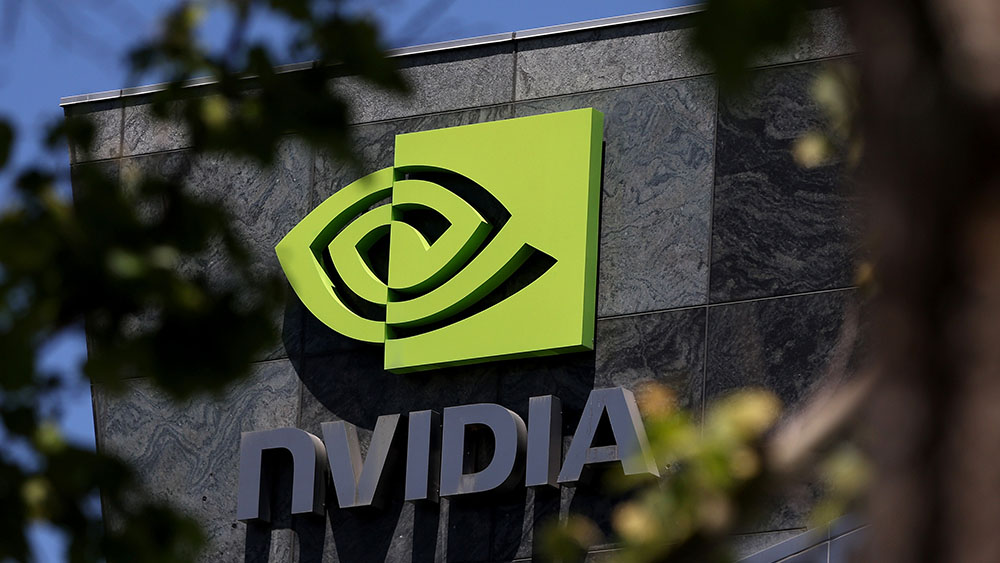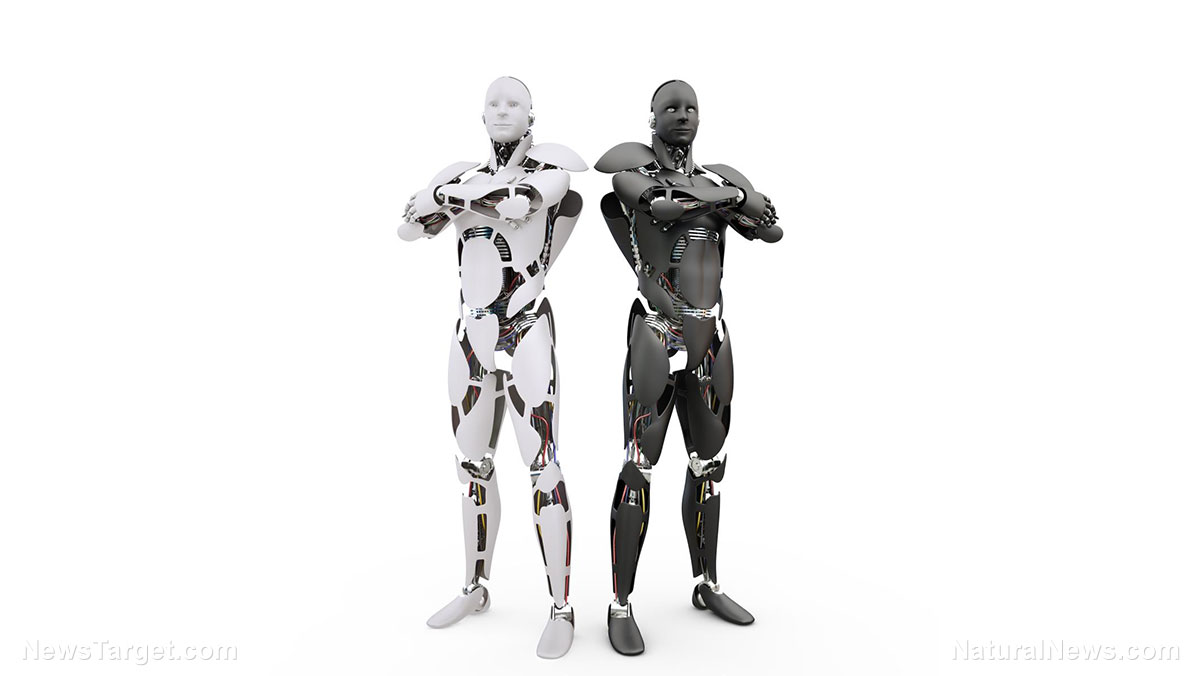Nvidia announces its own large language model, promises faster and more accurate responses
01/08/2025 / By Arsenio Toledo

- Nvidia CEO Jensen Huang unveiled the Llama Nemotron family of open large language models (LLMs) at CES 2025, a new LLM optimized for enterprise AI applications like coding assistants and autonomous systems.
- The Llama Nemotron models come in Nano, Super and Ultra sizes, catering to edge devices, data centers, and enterprise-specific tasks. The Ultra model acts as a “teacher model,” fine-tuning smaller models for enhanced performance.
- Built on Meta’s Llama 3.1, the models promise faster response times, greater accuracy, and support for tasks like coding, mathematics, and visual data analysis through the Cosmos Nemotron vision language models.
- While open-source for academic and research use, the models are restricted for commercial applications, allowing Nvidia to maintain control while leveraging Meta’s Llama ecosystem for enterprise-specific fine-tuning.
Nvidia CEO Jensen Huang announced the launch of the Llama Nemotron family of open large language models (LLMs) during his recent keynote address at the 2025 Consumer Electronics Show.
The new suite of AI models, built on Meta’s Llama foundation, is designed to optimize enterprise AI applications, from coding assistants to autonomous systems. With AI agents rapidly proliferating across industries, Nvidia’s latest innovation aims to address the growing demand for more powerful, efficient, and customizable AI solutions.
The Llama Nemotron models, available in three sizes – Nano, Super and Ultra – are tailored for diverse use cases, from edge devices to data centers. The Ultra model, in particular, is designed to act as a “teacher model,” capable of evaluating and fine-tuning smaller models, a feature Huang described as “incredible” for enterprise applications.
“These models are number one in leaderboards for chat, instruction, and retrieval,” Huang said. “They’re going to be incredible models for you.”
The announcement comes as enterprises increasingly seek to capitalize on AI investments. Over the past year, AI agents have expanded beyond coding to tackle a wide range of business tasks, from automated customer service to advanced data analysis. Major tech players like Microsoft, AWS and Google Cloud have already rolled out AI-powered tools, and Nvidia’s Llama Nemotron models are poised to join this competitive landscape. (Related: Nvidia unleashes super computer AI robots that will “learn” how to navigate and control the physical world.)
Nvidia promises LLM with faster response times and greater accuracy
Nvidia highlighted the fact that the Llama Nemotron models are built on Meta’s Llama 3.1 foundation, which has been downloaded over 650,000 times and adapted into approximately 60,000 derivative models, according to Huang. Recognizing the potential for enterprise-specific fine-tuning, Nvidia optimized the models for faster response times and greater accuracy. The result is a suite of models that can handle tasks ranging from coding and mathematics to image and video analysis.
The Cosmos Nemotron vision language models, part of the same family, enable AI agents to analyze and respond to visual data. These vision-focused agents are expected to find applications in autonomous machines, healthcare, retail, and even entertainment.
“The next giant AI service, period, is software coding,” Huang said. “Everybody is going to have a software assistant helping them code.”
Nvidia’s strategy hinges on partnerships with key players in the tech industry. SAP and ServiceNow are among the first companies expected to leverage the Llama Nemotron models, integrating them into their platforms to enhance automation and AI capabilities.
“All of our Nvidia AI technologies are integrated into the IT industry,” Huang emphasized during the keynote.
The models will be accessible via Nvidia’s NIM microservice, offering enterprises flexibility in deployment. While the models are open-source, they are restricted to academic and research use, ensuring that Nvidia maintains control over their commercial applications.
Nvidia’s announcement reflects a broader trend in the tech industry, where AI is increasingly being used to automate complex tasks and drive efficiency. The rise of AI agents marks a significant shift from traditional software development to AI-driven solutions, a transition that has accelerated since the launch of OpenAI’s ChatGPT in late 2022.
The Llama Nemotron models also highlight the growing importance of open-source AI frameworks. By building on Meta’s Llama foundation, Nvidia is tapping into a robust ecosystem of developers and researchers, while adding its own expertise to create models tailored for enterprise needs.
As AI continues to reshape industries, Nvidia’s Llama Nemotron models represent a significant step forward in the evolution of enterprise AI. With their ability to handle a wide range of tasks, from coding to visual analysis, these models are poised to become a cornerstone of AI-driven automation.
For enterprises, the promise of faster, more efficient AI solutions could translate into significant cost savings and productivity gains. For Nvidia, the launch of the Llama Nemotron family underscores its commitment to staying at the forefront of AI innovation, even as competition in the space intensifies.
As Huang put it during the keynote, “The thing that we did was realize that the Llama models really could be better fine-tuned for enterprise use. And so we fine-tuned them using our expertise and our capabilities.” The result is a suite of models that could redefine how businesses harness the power of AI.
Watch this clip from Yahoo Finance discussing the tech trends to watch out for in 2025, and why Nvidia is at the center of it all.
This video is from the TrendingNews channel on Brighteon.com.
More related stories:
AI data centers are straining the grid – and your home appliances are paying the price.
Apple to compete with NVIDIA, develop AI server chip named “Baltra.”
Sources include:
Submit a correction >>
Tagged Under:
Agentic AI, AI, artificial intelligence, Big Tech, chatbots, computing, Glitch, information technology, Jensen Huang, large language model, Llama Nemotron, LLM, NVIDIA, open source, open-source AI, robotics, robots, tech giants, technocrats
This article may contain statements that reflect the opinion of the author
RECENT NEWS & ARTICLES
COPYRIGHT © 2017 COMPUTING NEWS
















